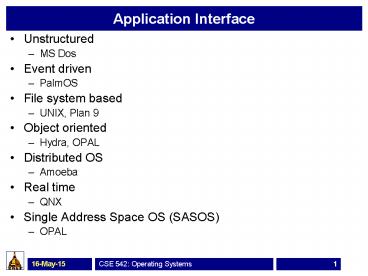Application Interface - PowerPoint PPT Presentation
Title:
Application Interface
Description:
Title: CSE 542: Operating Systems Author: Surendar Chandra Last modified by: Surendar Chandra Created Date: 8/26/2002 5:54:18 PM Document presentation format – PowerPoint PPT presentation
Number of Views:27
Avg rating:3.0/5.0
Title: Application Interface
1
Application Interface
- Unstructured
- MS Dos
- Event driven
- PalmOS
- File system based
- UNIX, Plan 9
- Object oriented
- Hydra, OPAL
- Distributed OS
- Amoeba
- Real time
- QNX
- Single Address Space OS (SASOS)
- OPAL
2
Outline
- Chapter 4 Processes
- Chapter 5 Threads
- Introduction to Threads Birrell
3
Processes
- Process is a program in execution
- Program code
- Data section
- Execution context Program counter, registers,
stack - Process has thread(s) of control
- Many processes run concurrently Process
scheduling - Fair allocation of CPU and I/O bound processes
- Context switch
4
Process States
5
Process Control Block
6
Process context switch
7
Process creation
- Creating new processes is expensive
- Resource allocation issue
- Fork mechanism UNIX, Windows NT
- Duplicate the parent process
- Shares file descriptors, memory is copied
- Exec to create different process
- Various optimizations to avoid copying the entire
parent context (Copy on write (COW), etc..) - Exec mechanism VMS, Windows NT
- New process is specifically loaded
8
Interprocess communication
- Processes need to communicate with each other
- Naming
- Message-passing
- Direct (to process) or indirect (port, mailbox)
- Symmetric or asymmetric (blocking, nonblocking)
- Automatic or explicit buffering (capacity)
- Send by copy or reference
- Fixed size or variable size messages
- Shared memory/mutexes
- Remote Procedure Call (RPC/RMI)
- Bounded buffer problem
9
CPU scheduling
- Interleave processes so as to maximize
utilization of CPU and I/O resources - Scheduler should be fast as time spent in
scheduler is wasted time - Switching context (h/w assists register windows
sparc) - Switching to user mode
- Jumping to proper location
- Preemptive scheduling
- Process could be in the middle of an operation
- Especially bad for kernel structures
- Non-preemptive (cooperative) scheduling
- Starvation
10
Threads
- Applications require concurrency. Threads provide
a neat abstraction to specify concurrency - E.g. word processor application
- Needs to accept user input, display it on screen,
spell check and grammar check - Implicit Write code that reads user input,
displays/formats it on screen, calls spell
checked etc. while making sure that interactive
response does not suffer. May or may not leverage
multiple processors - Threads Use threads to perform each task and
communicate using queues and shared data
structures - Processes expensive to create and do not share
data structures and so explicitly passed
11
Threaded application
12
Threads - Benefits
- Responsiveness
- If one task takes too long, other tasks can
still proceed - Resource sharing
- Grammar checker can check the buffer as it is
being typed - Economy
- Process creation is expensive (spell checker)
- Utilization of multiprocessor architectures
- If we had four processors (say), the word
processor can fully leverage them - Pitfalls
- Shared data should be protected or results are
undefined - Race conditions, dead locks, starvation (more
later)
13
Thread types
- Continuum Cost to create and ease of management
- User level threads (e.g. pthreads)
- Implemented as a library
- Fast to create
- Cannot have blocking system calls
- Scheduling conflicts between kernel and threads.
User level threads cannot do anything is kernel
preempts the process - Kernel level threads
- Slower to create and manage
- Blocking system calls are no problem
- Most OSs support these threads
14
Threading models
- One to One model
- Map each user thread to one kernel thread
- Many to one model
- Map many user threads to a single kernel thread
- Cannot exploit multiprocessors
- Many to many
- Map m user threads to n kernel threads
15
Threading Issues
- Cancellation
- Asynchronous or deferred cancellation
- Signal handling
- Relevant thread
- Every thread
- Certain threads
- Specific thread
- Pooled threads (web server)
- Thread specific data
16
Threads Andrew Birrell
- Seminal paper on threads programming
- Old but most techniques/experiences are still
valid - Birrell
- Xerox PARC?Dec SRC ?Microsoft Research
- Invented Remote Procedure Calls (RPC)
- Personal Juke box (hard disk based mp3 Apple
iPOD?) - Worked on Cedar, Distributed FS etc for 25 years
(1977-
17
Threads Andrew Birrell
- Dec SRC and Xerox PARC were the premium systems
research labs - PARC researchers invented
- Personal computers - Alto
- Mouse
- Windows - Star
- Bitmapped terminals
- Icons
- Ethernet
- Smalltalk
- Bravo first WYSIWYG program
- Laser printer
18
Windows 2000
19
Wizard ps -cfLeP output
- UID PID PPID LWP PSR NLWP CLS PRI
STIME TTY LTIME CMD - root 0 0 1 - 1 SYS 96
Aug 03 ? 001 sched - root 1 0 1 - 1 TS 59
Aug 03 ? 712 /etc/init - - root 2 0 1 - 1 SYS 98
Aug 03 ? 000 pageout - root 3 0 1 - 1 SYS 60
Aug 03 ? 27546 fsflush - root 477 352 1 - 1 IA 59
Aug 03 ?? 00 - /usr/openwin/bin/fbconsole -d 0
- root 62 1 14 - 14 TS 59
Aug 04 ? 000 - /usr/lib/sysevent/syseventd
20
Discussion
- Constant tension between moving functionality to
upper layers involving the application
programmer and performing automatically at the
lower layers - Automatically create/manage threads by compiler/
system? (open research question)

